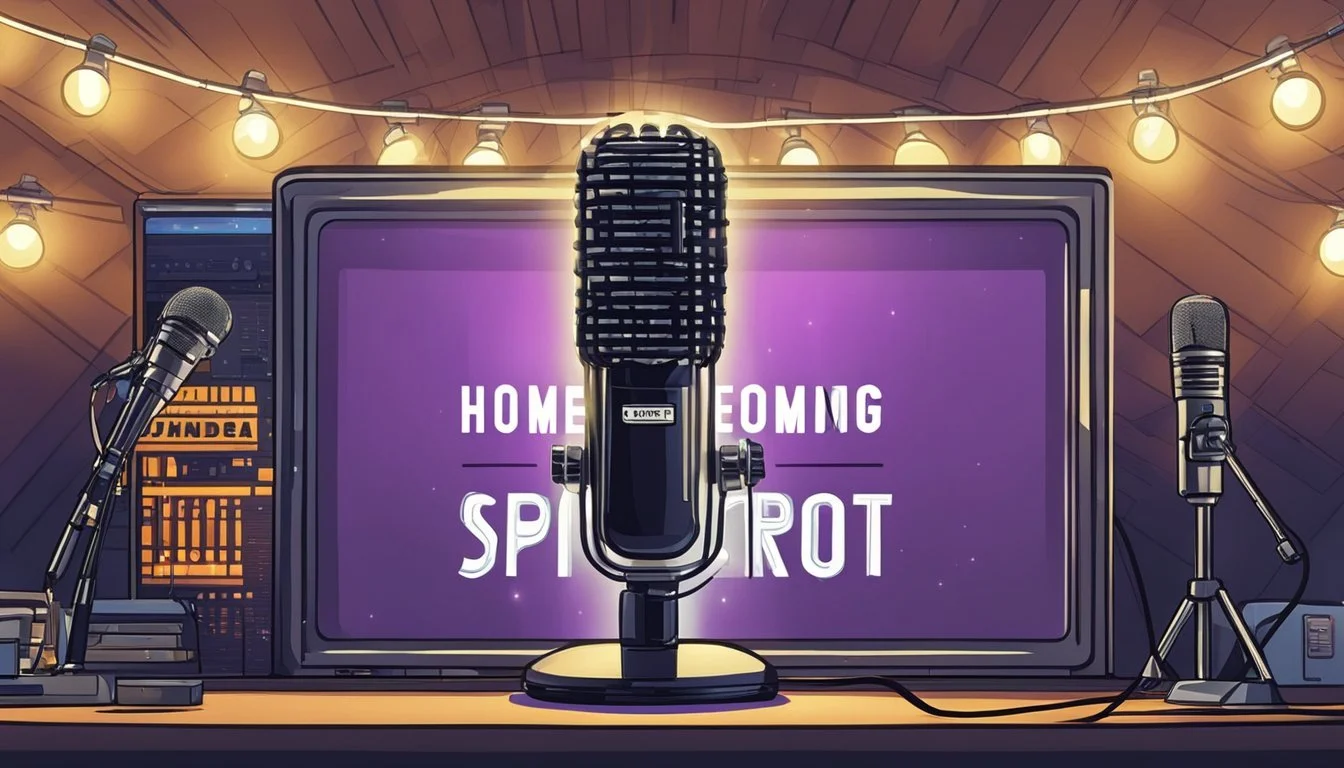Homecoming: The Podcast That Launched a Thousand Scripts
Exploring Its Impact on Modern Storytelling
Homecoming revolutionized the podcast landscape when it debuted in 2016. As Gimlet Media's first scripted fiction series, it broke new ground in audio storytelling. The show's innovative format, presented as an enigmatic collage of phone calls, therapy sessions, and overheard conversations, captivated listeners and set a new standard for fictional podcasts.
The star-studded cast, including Catherine Keener, Oscar Isaac, and David Schwimmer, brought the mysterious story to life. Set in Florida, Homecoming follows a caseworker at an experimental facility, her ambitious supervisor, and a soldier eager to rejoin civilian life. The podcast's unique blend of suspense, mystery, and character-driven drama quickly garnered critical acclaim and a devoted fanbase.
Homecoming's success extended beyond the audio medium. Its compelling narrative and innovative structure caught the attention of television producers, leading to a Prime Original TV series adaptation starring Julia Roberts. This crossover success demonstrated the potential for podcasts to serve as a launching pad for other forms of media, opening up new possibilities for storytellers in the digital age.
Origins and Creators
Homecoming emerged as a groundbreaking podcast that reshaped audio storytelling. Its innovative approach and compelling narrative paved the way for its adaptation into other media formats.
Gimlet Media's Role in Homecoming
Gimlet Media, a pioneering podcast production company, played a crucial role in bringing Homecoming to life. The company provided the platform and resources necessary to create and distribute the audio drama. Gimlet's reputation for high-quality content helped attract talent and listeners to the project.
The podcast benefited from Gimlet's expertise in audio production and storytelling techniques. This collaboration resulted in a polished, immersive listening experience that captivated audiences and garnered critical acclaim.
Inception by Micah Bloomberg and Eli Horowitz
Micah Bloomberg and Eli Horowitz, the creative minds behind Homecoming, conceptualized and developed the podcast's unique narrative structure. Their vision for an audio-driven psychological thriller set the project apart from traditional podcasts.
Bloomberg and Horowitz crafted a script that maximized the potential of the audio format. They utilized phone calls, therapy sessions, and overheard conversations to build tension and reveal the story gradually.
The creators' innovative approach to storytelling attracted top-tier voice talent, including Catherine Keener and Oscar Isaac. This star power further elevated the podcast's profile and contributed to its success.
Plot Overview
Homecoming's narrative centers on a soldier's journey from military service to civilian life through an experimental facility. The story unfolds through therapy sessions and phone calls, revealing the mysterious workings of the program and its impact on those involved.
Transition from Military to Civilian Life
Walter Cruz, a soldier eager to rejoin civilian life, enters the Homecoming program. He participates in therapy sessions with Heidi Bergman, a caseworker at the facility. Their interactions form the core of the story, exploring Walter's struggles and hopes for the future.
The podcast delves into Walter's experiences adjusting to life outside the military. It highlights the challenges veterans face, including PTSD, reintegration into society, and finding purpose in civilian roles.
Through recorded conversations, listeners gain insight into Walter's progress and setbacks. The story raises questions about the effectiveness of veteran support programs and the complexities of transitioning from military to civilian life.
Mysterious Workings of the Facility
The Homecoming facility's true nature slowly comes to light as the plot unfolds. Heidi Bergman, the caseworker, becomes increasingly aware of the program's hidden agendas. Her ambitious supervisor, Colin Belfast, pushes for results while keeping secrets.
Strange occurrences and inconsistencies in the facility's operations raise suspicions. The therapy sessions take unexpected turns, hinting at experimental treatments beyond standard care. Recorded phone calls reveal conflicting information about the program's goals.
The podcast creates an atmosphere of intrigue through its audio format. Listeners piece together clues from fragmented conversations and therapy recordings. The mysterious workings of the facility drive the plot forward, keeping audiences engaged with each new revelation.
Key Characters and Cast
Homecoming's stellar cast brought depth and nuance to the podcast's intriguing characters. The show featured a mix of established Hollywood stars and talented voice actors who breathed life into the complex narrative.
Leading Roles
Catherine Keener starred as Heidi Bergman, the social worker at the heart of the story. Her nuanced performance captured Heidi's conflicted emotions and growing unease. Oscar Isaac portrayed Walter Cruz, a soldier eager to rejoin civilian life. Isaac's charismatic voice work conveyed Walter's optimism and vulnerability.
David Schwimmer took on the role of Colin Belfast, Heidi's ambitious supervisor. Schwimmer's portrayal highlighted Colin's ruthless drive and manipulative nature. These central characters formed the core of Homecoming's psychological drama, with their interactions driving much of the plot's tension and mystery.
Supporting Cast
Amy Sedaris and David Cross added their comedic talents to the supporting cast, bringing moments of levity to the often-tense storyline. Sedaris played Colin's boss, while Cross took on multiple minor roles throughout the series.
The podcast also featured a talented ensemble of voice actors who populated the world of Homecoming. These performers created a rich audio landscape, from government officials to other patients at the facility.
Critical Reception
"Homecoming" received widespread acclaim for its innovative storytelling and stellar performances. Critics praised its unique audio format and gripping narrative.
Audience Response
Listeners embraced "Homecoming" with enthusiasm. The podcast garnered high ratings across various platforms, with many praising its immersive audio experience. Fans appreciated the show's complex characters and intricate plot twists.
The star-studded cast, including Catherine Keener and Oscar Isaac, drew significant attention. Their performances were widely lauded for bringing depth and authenticity to the characters.
Many listeners reported binge-listening to the series, captivated by its suspenseful storytelling. The podcast's success led to increased interest in scripted audio dramas.
Critique of Narrative and Production
Critics hailed "Homecoming" for its innovative narrative structure. The non-linear storytelling and use of realistic sound design created a uniquely engaging experience.
Reviewers praised the show's tight pacing and well-crafted dialogue. The podcast's ability to build tension through audio cues and carefully timed revelations was frequently highlighted.
Some critics noted the podcast's cinematic quality, comparing it favorably to TV dramas. This led to discussions about the potential of podcasts as a serious storytelling medium.
The show's exploration of memory, identity, and ethics received particular acclaim. Critics appreciated its nuanced approach to complex themes within the thriller genre.
Series Progression
Homecoming's podcast series unfolded across multiple seasons, each expanding the narrative and exploring new thematic territory. The show's structure and storytelling evolved as it progressed, keeping listeners engaged with fresh developments and deeper character insights.
Seasonal Breakdown
Season 1 introduced listeners to Heidi Bergman and the mysterious Homecoming facility. It consisted of 6 episodes, each around 20-30 minutes long. The story alternated between two timelines, gradually revealing the truth behind the Homecoming project.
Season 2 picked up where the first left off, delving deeper into the conspiracy. It maintained the 6-episode format but introduced new characters and plot threads. This season expanded the show's scope beyond the facility itself.
The Complete Series, including both seasons, totaled 12 episodes. Each installment built upon the previous, creating a cohesive and intricate narrative tapestry.
Evolving Themes and Directions
As Homecoming progressed, its themes grew more complex. Initially focused on memory and identity, later episodes explored corporate ethics and government accountability. The show's tone shifted from psychological mystery to broader societal critique.
Character development became increasingly nuanced. Heidi's journey from naive caseworker to determined investigator reflected the series' overall trajectory. Supporting characters gained depth, their motivations becoming more ambiguous and layered.
The podcast's unique audio format evolved too. Later episodes incorporated more sophisticated sound design and narrative techniques, enhancing the immersive experience for listeners.
Adaptations and Spin-offs
Homecoming's success as a podcast led to high-profile adaptations and inspired other media creators. The show's transition to television and its broader influence demonstrate how podcasts can serve as a launchpad for compelling stories across different formats.
Transition to Television
Amazon Prime Video adapted Homecoming into a critically acclaimed TV series in 2018. The show starred Julia Roberts as Heidi Bergman in her first major television role. While the TV adaptation maintained the podcast's core narrative, it expanded the story and visual elements. The series received praise for its taut storytelling and Roberts' performance.
Amazon renewed Homecoming for a second season, which aired in 2020. This season introduced new characters and plotlines, further developing the world established in the podcast. The TV adaptation's success highlighted the potential for podcasts to be transformed into visually engaging and commercially viable television productions.
Influence on Other Media
Homecoming's journey from podcast to TV series set a precedent in the entertainment industry. It inspired other podcasts to pursue similar adaptations. The show's format and storytelling techniques influenced both audio and visual media creators.
Several other podcasts followed Homecoming's lead, securing TV and film deals. This trend led to increased investment in podcasting as a medium for developing original stories. Production companies began viewing podcasts as potential sources for new content, leading to a surge in scripted fiction podcasts.
The success of Homecoming also encouraged experimentation with narrative structures and audio production techniques in podcasting. Its influence extended beyond adaptations, shaping how creators approach storytelling in both audio and visual formats.
Discovering Homecoming
Homecoming captivated audiences with its innovative storytelling and immersive audio experience. The podcast's psychological thriller format drew listeners in, offering a unique way to engage with scripted content.
Ways to Experience the Podcast
Homecoming is available on major podcast platforms, including Apple Podcasts and Spotify. Listeners can stream or download episodes for offline enjoyment. The series consists of multiple seasons, each containing bite-sized episodes perfect for binge-listening.
For an enhanced experience, using headphones is recommended. This allows listeners to fully appreciate the intricate sound design and nuanced performances. Some fans prefer to listen in a quiet environment to catch every detail of the complex narrative.
Highlighting the Unique Features
Homecoming stands out for its star-studded cast and cinematic audio production. The podcast features actors like Catherine Keener, Oscar Isaac, and David Schwimmer, bringing their talents to the audio medium.
The storytelling employs an enigmatic collage of phone calls, therapy sessions, and overheard conversations. This innovative structure creates a suspenseful atmosphere, keeping listeners engaged throughout the series.
Sound design plays a crucial role in Homecoming's immersive experience. Carefully crafted audio cues and ambient sounds transport listeners into the world of the story, enhancing the psychological thriller elements.
Cultural Impact
Homecoming's innovative storytelling format and star-studded cast revolutionized the podcasting landscape. The show's success paved the way for high-quality scripted audio dramas and influenced the broader entertainment industry.
Impact on Podcasting
Homecoming set a new standard for scripted podcasts. Its immersive audio experience and compelling narrative attracted listeners who previously may not have engaged with the medium. The show's success encouraged other creators to experiment with serialized fiction podcasts.
Many podcasters adopted Homecoming's production techniques, including its use of sound design and non-linear storytelling. This led to an increase in the overall quality of podcast content across various genres.
The podcast's ability to attract A-list talent like Catherine Keener and Oscar Isaac also raised the profile of audio dramas. It demonstrated that podcasts could be a viable platform for established actors and writers to showcase their work.
Homecoming's Role in Media Evolution
Homecoming blurred the lines between traditional media formats. Its adaptation into a successful Amazon Prime television series showcased the potential for podcasts to serve as source material for visual media.
This crossover success sparked interest from production companies and streaming platforms in podcast-to-screen adaptations. It opened new avenues for storytellers to develop and test concepts before committing to costly video production.
The show's triumph also influenced how media companies approach content creation. Many began to view podcasts as a testing ground for ideas that could later be expanded into other formats.
Homecoming's innovative approach to storytelling inspired creators in other media. Its non-linear narrative structure and use of found footage-style audio influenced television shows and films, expanding the creative possibilities in visual storytelling.
Marketing and Promotion
"Homecoming" utilized innovative strategies to promote its groundbreaking podcast. The show's marketing focused on leveraging its star-studded cast and unique storytelling format to generate buzz and attract listeners.
Advertising Strategies
The "Homecoming" team created an intriguing trailer to showcase the podcast's mysterious atmosphere and high-quality production. This preview highlighted the show's stellar cast, including Catherine Keener and Oscar Isaac. The trailer was distributed across various audio platforms and social media channels to maximize reach.
Gimlet Media partnered with targeted podcast networks to place ads for "Homecoming" on popular shows with similar audiences. These ads often featured short clips from the podcast to give potential listeners a taste of the engaging content.
The show's website served as a central hub for marketing efforts. It provided episode descriptions, cast information, and behind-the-scenes content to entice visitors and keep fans engaged between releases.
Audience Engagement
"Homecoming" fostered audience engagement through active social media presence. The show's Twitter account shared teasers, quotes, and exclusive content to build anticipation for upcoming episodes.
Interactive elements were incorporated into the marketing strategy. Online puzzles and cryptic messages related to the show's plot were released, encouraging fans to discuss theories and speculate about future developments.
The podcast team organized live events and Q&A sessions with cast members, allowing fans to connect directly with the creators and actors. These events generated additional media coverage and word-of-mouth promotion.
Behind the Scenes
The creation of Homecoming involved meticulous writing, innovative production techniques, and a dedicated creative team. This section explores the intricate process behind crafting the podcast's compelling narrative and the technical aspects that brought it to life.
Writing and Creative Process
Eli Horowitz and Micah Bloomberg, the creators of Homecoming, developed a unique approach to scripting the podcast. They focused on crafting realistic dialogue that captured the essence of each character. The writers paid special attention to the nuances of conversation, incorporating natural pauses and interruptions.
Their process involved multiple rounds of revisions, fine-tuning each scene to maximize tension and engagement. Horowitz and Bloomberg worked closely with voice actors, allowing for collaborative input that enhanced character authenticity.
The creators drew inspiration from classic thriller films and contemporary TV series, blending elements to create a fresh narrative style. They structured the story with careful pacing, using cliffhangers and reveals to keep listeners hooked.
Technical Insights
Homecoming's production team employed cutting-edge audio techniques to create an immersive listening experience. They utilized binaural recording methods to give depth and dimensionality to scenes.
Sound designers meticulously crafted ambient noises and background effects to enhance the podcast's atmosphere. They experimented with different microphone placements to capture the subtleties of actor performances.
The editing process involved layering multiple audio tracks, balancing dialogue with sound effects and music. Producers used dynamic compression and EQ adjustments to ensure clarity across various listening devices.
To maintain consistency, the team developed a detailed sound bible, outlining specific audio cues for recurring locations and characters. This attention to detail helped create a cohesive auditory world that listeners could easily visualize.











